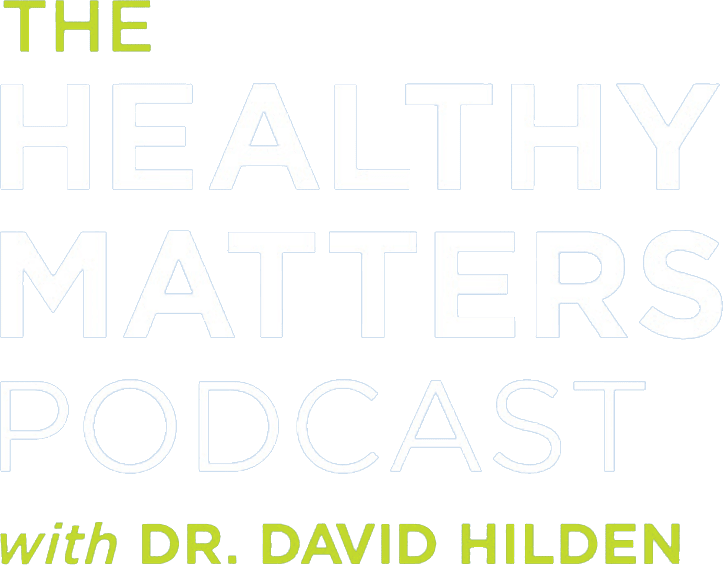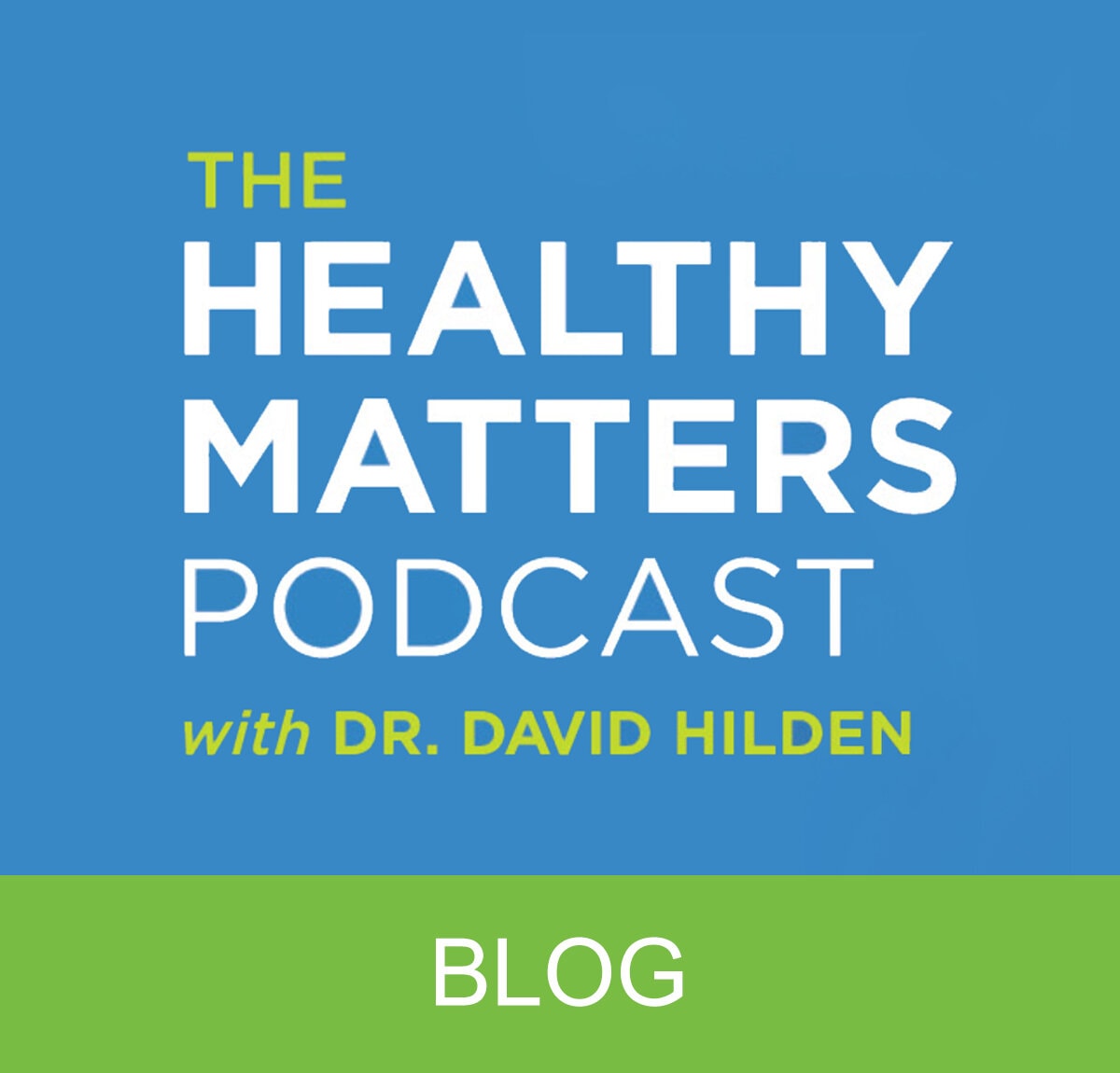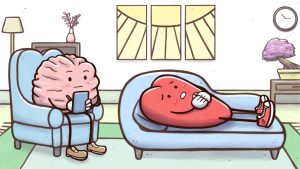Has anyone ever died of a broken heart?
There’s definitely a connection between the heart and mind, and in this Healthy Matters episode I’ve brought together two of the best minds to talk about the relationship between our mental health and physical health. Dr. Eduardo Colon chairs our Psychiatry Department and Dr. Steven Goldsmith is a cardiologist and nationally recognized expert in heart failure.
“You can die from a broken heart,” said Dr. Steven Goldsmith. “Fortunately, most of the time this is diagnosed in the context of other significant physical illnesses, such as an acute episode of lung disease, exacerbation or pancreatitis – but it can definitely occur.”
So where does the mental health connection come from? (Spoiler alert: it’s related to that thing between your shoulders.)
“When I was a kid, I borrowed a book that was called ‘The Body has a Head,’” said Dr. Colon. “It’s something I that I think about pretty often, because when we have this discussion about your emotions or your psychological wellbeing, people think about the mind, and we tend to forget that we have this incredible organ in our body – our brain – that’s connected to every other organ and regulates a lot of function.”
Dr. Colon shared what he learned about a guy who’s written a paper on “voodoo death,” (yes, it’s as creepy as it sounds) as well as how the need for mental health care has grown dramatically in recent years due to the pandemic.
“The isolation that we’ve all experienced, and certainly the narrowing down of the level of activity. I sometimes say that we were stuck on Groundhog’s Day in terms of the routines: fear of getting ill, the acknowledgment of the impact of the pandemic and people around you in your sense of vulnerability.” Dr. Colon also acknowledged that there has been a loss of sobriety for people with substance use disorders, and he’s seen people who have been struggling with preexisting mental health illnesses such as depression. These of course can lead to other concerns.
“Physical or mental stress can cause a form of heart disease called stress cardiomyopathy,” explains Dr. Goldsmith. “And what that means is that the heart suddenly – for no other reason – seems to not work very well, and it’s usually not fatal. It’s usually reversible, but you can die from it.”
The convergence of stress, inflammation, hormones and even genetics can create just the right conditions for heart failure. But there are ways to reduce some of these risk factors, and the doctors offered a few great suggestions including yoga, meditation and mindfulness – something that I mention I may need to practice, too.
We round out the episode with a couple of questions from listeners: one who’s experiencing heartache and another who’s concerned about his family’s history of heart issues. Healthy Matters of the heart that matter to you on Episode Five – enjoy!
Addiction creates the “perfect storm of perfect storm badness”
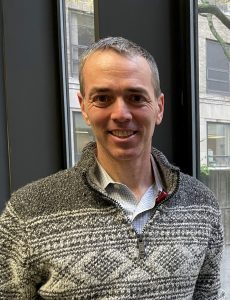 Did you know that one in 100 people in the U.S. is experiencing an addition to opiates? Have you wondered how some people can become addicted to something when others do not?
Did you know that one in 100 people in the U.S. is experiencing an addition to opiates? Have you wondered how some people can become addicted to something when others do not?
In Episode 4 of The Healthy Matters Podcast I’m joined by my friend and colleague Dr. Charlie Reznikoff – an addiction medicine expert who’s going to help us break down some of the myths and offer insights on how addiction can be treated.
“Addiction is many things,” he explains. “It can result from an untimely exposure to drugs, trauma in childhood mixed with, a little bit of bad genetic luck.”
We also talked about the most addictive drugs and the top one may surprise you. It’s on the “fastest track from outside your body to inside your brain.” Can you guess what it is?
So why do some of us struggle with addiction while others do not? We go into more detail about this and how most of us can simply have one drink or one painkiller and not give it another thought, while others will have concerns or are at a higher risk for addiction.
Dr. Reznikoff also talked about COVID-19’s effect on the opioid crisis and fentanyl’s connection to Wuhan, China. Yes, that Wuhan, China where COVID-19 was first reported.
“Fentanyl is an illicit, highly potent synthetic opioid that is cooked in China, or at least produced in China and shipped to America,” he said. “So when traffic to and from Wuhan was shut down in 2020, the shipments of fentanyl also became limited and those addicted to it had to find other sources, which created the ‘perfect storm of perfect storm badness.’”
Episode 4 of The Healthy Matters Podcast also covers addiction questions about alcohol, nicotine and even caffeine – as well as a brief discussion about the best and most expensive cup of coffee we’ve ever had.
The phone lines are always open for Hilden’s House Calls
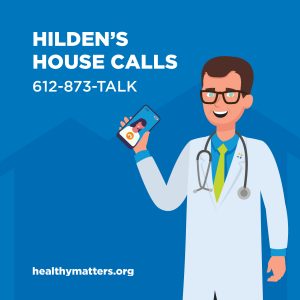 Hilden’s House Calls makes its debut on Episode 3 of The Healthy Matters Podcast, but it’s really nothing new. I’ve been answering your health questions for more than 13 years on the radio and I have no intention of stopping. Your thoughtful questions make for great discussion and are so informative for more than just the person asking the question. Remember, anyone can ask a health question by calling 612-873-TALK (8255) anytime and leaving a message. You can also send me an email at healthymatters@hcmed.org or tweet your question on Twitter @DrDavidHilden.
Hilden’s House Calls makes its debut on Episode 3 of The Healthy Matters Podcast, but it’s really nothing new. I’ve been answering your health questions for more than 13 years on the radio and I have no intention of stopping. Your thoughtful questions make for great discussion and are so informative for more than just the person asking the question. Remember, anyone can ask a health question by calling 612-873-TALK (8255) anytime and leaving a message. You can also send me an email at healthymatters@hcmed.org or tweet your question on Twitter @DrDavidHilden.
In Episode 3 George from St. Paul asks about the accuracy of COVID home self-test kits and if washing hands and wiping down stuff is still an effective way to reduce the risk for transmitting COVID. Remember wiping down groceries? Carol from Buffalo asks how Omicron differs from other variants of COVID, and Eric from Mankato wonders how come people have different symptoms when they get the virus. We also talk about masks, vaccines and the influenza epidemic of 1918.
But we don’t spend the entire time talking about COVID – we also had a great question about chest pain and how it can be different for men and women. And you know me, I don’t just answer questions with a yes or no. You’ll get an earful that includes some background, what’s happening inside your body, symptoms to watch for, and what to do if you’re experiencing a health concern.
As always, I can only give general medical advice during Healthy Matters and every case is unique. Please consult with your personal physician if you have more serious or pressing health concerns. (And if you don’t have a personal physician – please get one. We also talk about how important that is in this episode!)
